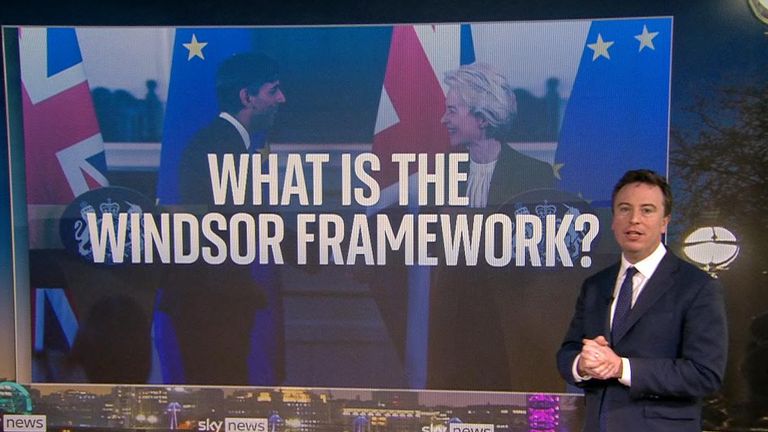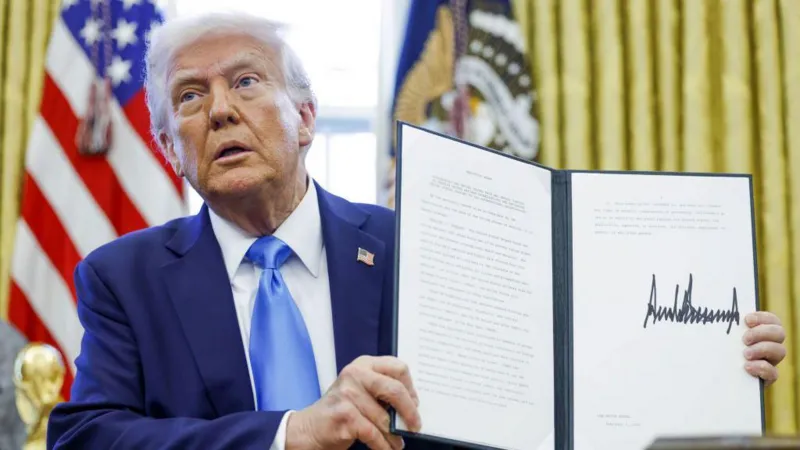DUP and Tory MP to vote against key part of Windsor Framework over 'fundamental problems'
The DUP has said it will vote against Rishi Sunak's Brexit deal, saying while there has been "significant progress" to fix issues with the protocol "fundamental problems" remain.

The DUP and at least one Tory backbencher have said they will vote against a key aspect of Rishi Sunak's Brexit deal when it is put to a crunch vote in parliament this week.
In a statement, Democratic Unionist Party (DUP) leader Sir Jeffrey Donaldson said while the Windsor Framework represented "significant progress" in addressing concerns with the Northern Ireland Protocol, it does not deal with some of the "fundamental problems at the heart of our current difficulties".
As a result, they have said they will vote against the first aspect of the deal to be considered by MPs - the Stormont brake.
Politics live: The WhatsApp messages Boris Johnson believes will help vindicate him over partygate
This would allow a minority of politicians in Belfast to formally flag concerns about the imposition of new EU laws in Northern Ireland - a move that could see the UK Government veto their introduction in the region.
Former trade minister James Duddridge became the first Tory MP to say he will vote against the Stormont brake as he believes it is a "betrayal of Brexit".
He told Sky News he believes other Brexit-supporting backbenchers might join his rebellion, including Tory MPs such as John Redwood, Mark Francois, Bill Cash and David Jones.
Downing Street said the Stormont brake would address the so-called "democratic deficit" caused by the protocol, but Sir Jeffrey said the brake "is not designed for, and therefore cannot apply, to the EU law which is already in place and for which no consent has been given for its application".
"Whilst representing real progress, the 'brake' does not deal with the fundamental issue which is the imposition of EU law by the protocol," he said.
Downing Street said it has no plans to change the framework despite the DUP's decision to oppose it.
However, the prime minister's official spokesperson said ministers stood ready to have further consultations with the party ahead of Wednesday's Commons vote.
The DUP's opposition does not mean the legislation will fail, but it makes the likelihood of the unionist party rejoining powersharing slimmer.
The party pulled out of the arrangement for devolved government in Northern Ireland early last year in protest at the protocol.
The mechanism was agreed by Boris Johnson under his "oven ready" Brexit deal to prevent a hardening of the land border on the island of Ireland - which all sides agreed was necessary to preserve peace.
But it led to trade barriers being created between Great Britain and NI, effectively creating a customs border down the Irish sea - something the former prime minister promised would not happen.
The UK and Brussels agreed the framework as a way to cut the red tape created by the protocol, while giving politicians in Northern Ireland more of a say over EU laws in the region.
Framework 'best deal for Northern Ireland'
Foreign Secretary James Cleverly and the EU's Maros Sefcovic, who led talks from Brussels' side, are still set to meet this Friday to adopt the agreement.
In response to the DUP's statement, a Downing Street spokesman said: "We remain confident that this is the best deal for Northern Ireland."
They added: "The DUP are important partners in this. We want to answer any further questions they have and provide any necessary reassurance and we stand ready to do that."
Sinn Fein Stormont leader Michelle O'Neill also backed the Windsor Declaration, saying the onus is now on the governments and parties to get devolved government in Northern Ireland moving.
"The deal is done & huge economic opportunities are before us," she tweeted.
"The Brexit Joint Committee meets 24 March to adopt the deal into EU law & we move onto implementation stage.
"The onus is on the British & Irish Governments & all parties - not least the DUP to now get Stormont moving."
Return of powersharing 'up in the air'
A DUP source said that the return of the NI assembly remains "up in the air and depends on pace of government putting in arrangements unionists can support".
They criticised the prime minister for "forcing a vote", saying a better approach would have been to "recognise progress and keep working at it".
Downing Street has indicated the vote on the Stormont brake will be read as indicative of parliament's position on the wider deal.
The DUP's criticism could pave the way for a wider government rebellion, as many Tory Eurosceptics were waiting to see what the party said about the framework before deciding whether to back the government.
Announcing its intention ahead of Wednesday's vote, Sir Jeffrey said: "Our party officers, the only decision-making mechanism in our party on these matters, met this morning and unanimously agreed that in the context of our ongoing concerns and the need to see further progress secured whilst continuing to seek clarification, change and re-working, that our Members of Parliament would vote against the draft statutory instrument on Wednesday."
He said that his party will continue to work with the government "on all the outstanding issues".
"It is our party view that there remain key areas of concern which require further clarification, re-working and change as well as seeing further legal text," the DUP leader added.
-sky news







